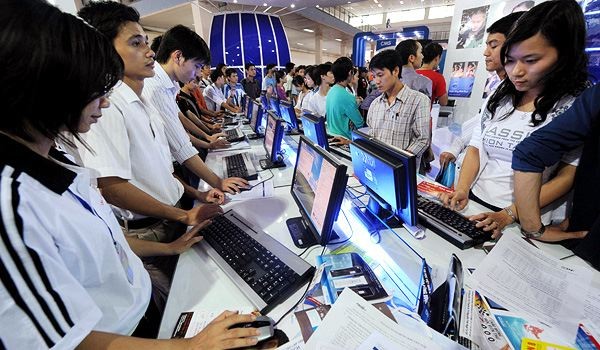Reporters Without Borders distort internet freedom in Vietnam
(VOVworld) - On Press Freedom Day, May 3rd, 2013, the Reporters Without Borders published a press freedom index, which includes distortions about press freedom in Vietnam. This shows the organization’s willingness to abuse internet freedom to intervene in Vietnam’s internal affairs. VOV editor Thu Hoa comments.
 |
| The number of internet users has risen rapidly in Vietnam |
According to Vietnam's White Book on Information and Communication Technologies, Vietnam now has more than 31 million internet users- 35% of the country’s total population- and now ranks 18th in the world, 8th in Asia and 3rd in ASEAN for total number of internet users. Since 2000, the number of internet users in Vietnam has increased 15 fold. Vietnam leads ASEAN in the number of national domain registrations. According to the Ministry of Information and Communication, by the end of 2012, the total number of 3G subscribers in Vietnam was nearly 20 million and the number of Facebookers in Vietnam rose from 8.5 million in October 2012 to 12 million in March of this year. The number of Yahoo 360 Plus members is 2.3 million, Yume 2.4 million, wordpress.com 2.9 million and blogspot.com 5.1 million. These figures reflect the rapid growth of internet use in Vietnam since 1997 thanks to its open policies and undeniable internet freedom. This shows that Reporters Without Borders distorted the reality in Vietnam when the organization stated that Vietnam has not achieved any progress in press freedom and remains in the group of 10 countries with the least press freedom.
By ranking Vietnam at the bottom of the 2013 press freedom index, Reporters Without Borders maintained a biased, distorted and prejudiced view, imposed this bias on its assessment of internet freedom in Vietnam. Since the first celebration of World Day against Cyber Censorship in 2008, Reporters Without Borders has listed Vietnam as one of the Enemies of the Internet. Since then, despite the rapid growth of internet use in Vietnam, this organization has not changed its view. In the last 5 years, RWB has consistently listed Vietnam as an enemy of the internet showing its own lack of objectivity. In its report on the 2013 World Day against Cyber Censorship, Reporters Without Borders said stated that Vietnam has cyber security forces, but ensuring cyber security is normal in every country that has the internet. This organization also distorted and spread the slander that Vietnam suppresses internet freedom, falsely claiming that Vietnam is the world’s second largest prison for netizens. In fact, the bloggers that Reporters Without Borders used as examples were individuals who abused the internet to cause disorder in Vietnam and were convicted publicly under Vietnamese law. The Vietnamese State, on one hand, creates the best positive conditions for internet development and on the other hand, has strict regulations to protect internet users from harmful information, prevent negative impacts on Vietnamese morality, culture and tradition, and prevent bad people from abusing the internet to threaten national security. Other countries have similar laws to ensure cyber security.
The public rightly wonders how, if what Reporters Without Borders has stated is true, that Vietnam is an enemy of the internet, the number of internet users in Vietnam could increase 15 fold from 1992 to 2012. The answer to this question reveals the truth about internet freedom in Vietnam.
Thu Hoa